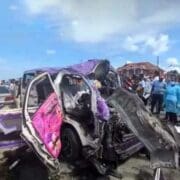Criminologist: Proactive justice system key to managing gun violence
Black Immigrant Daily News
Police and crime scene investigators process the crime scene of a murder and attempted robbery at Pennywise Plaza, La Romain. Photo by Marvin Hamilton
CRIMINOLOGY lecturer and author Wendell Wallace says the justice system in this country has to adapt and make changes, particularly through legislation, to fulfil its mandate in order to deal with the ever increasing scourge of gun violence.
The establishment of gun courts, denying bail for those charged with gun offences, and implementing a “three-strike” rule via legislation, he suggested, are among the numerous tangible solutions.
Wallace, a lecturer in the Criminology and Criminal Justice Unit at the University of the West Indies (UWI) St Augustine Campus, was speaking at a forum recently hosted by the Sir Arthur Lewis Institute of Social and Economic Studies on the topic of gun-related violence and homicide in Caribbean societies, which offered expert insights into data and reflected on potential action to improve the worsening statistics.
“What can we do? Because we don’t only want to highlight these problems? We want that we look for some solutions.”
He said the the justice system “can do a lot.”
Wallace said a multifaceted, evidence-based approach to is needed to address the complex problem of gun violence and the justice system.
He highlighted data showing that between 2010-2016, there were 2,212 victims of homicide by firearms, 95 per cent of them being male. He said this is comparable with Jamaica where approximately 90 per cent of the victims are male.
Recently, acting Commissioner of Police McDonald Jacob announced that 7,000 guns had been recovered by police over the last ten years.
On Saturday, the police issued another statement saying the number of guns seized for the year had crossed 500.
Jacob also noted that 87 per cent of all murders in TT over the past decade were committed using guns.
These statistics are particularly noteworthy, he said, since no English-speaking country in the Caribbean manufactures firearms. Most are believed to be imported from the US and Brazil and slip through the borders.
“That begs the question,” he said. “Are we suffering from a gun-violence crisis as it relates to TT?”
Wallace noted the drastic increase of guns being used in homicides around the year 2000.
He highlighted the statistics from 2010-2016, showing the Port of Spain Police Division leading the nine divisions with 593 murders involving guns, followed by the Northern Police Division with 463 and the Western Police Division in third with 260 murders.
The Tobago Police Division saw the least number of murders involving guns, totalling 13 for the seven-year period.
As Wallace, noted, however, Tobago experienced three murders involving firearms in only three days, last month.
“If we were to use some conjecture here, we will suggest that the numbers for the Tobago Police Division will certainly increase.
He spoke further on potential ways the justice system can address gun-related violence.
Wallace noted that Jacob expressed regret about TT’s gun culture, and former Commissioner of Police Gary Griffith’s suggestion that those charged with gun possession not be allowed bail.
Griffith also called for the court to increase penalties for firearm offences.
“We need a multifaceted approach; a uni-dimensional approach will not work. And the justice system can either use a prevention approach or an intervention approach or a combination of both.”
Among Wallace’s solutions offered included gun amnesties, which he admitted “tend not to work for criminals (because) that’s their tool of trade.”
Establishing gun courts is another potential part solution.
“The research has shown that this tends to work in that you are able to process these criminals faster.
“We must also have enhanced reporting mechanisms and protection for witnesses in gun-related crimes,” Wallace said.
“We can use focus deterrents. We can use outreach activities, public education campaigns. We can also use intervention strategies.
“We need to use some awareness campaigns so that all juveniles and others can be aware of the dangers of using fire.”
NewsAmericasNow.com










Leave a Reply
Want to join the discussion?Feel free to contribute!